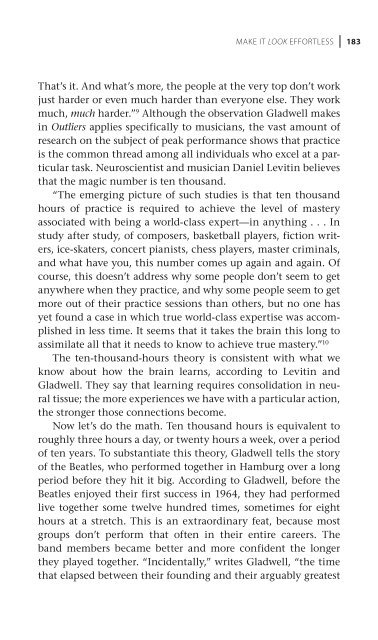Presentation-Secrets-Of-Steve-Jobs
You also want an ePaper? Increase the reach of your titles
YUMPU automatically turns print PDFs into web optimized ePapers that Google loves.
MAKE IT LOOK EFFORTLESS 183<br />
That’s it. And what’s more, the people at the very top don’t work<br />
just harder or even much harder than everyone else. They work<br />
much, much harder.” 9 Although the observation Gladwell makes<br />
in Outliers applies specifically to musicians, the vast amount of<br />
research on the subject of peak performance shows that practice<br />
is the common thread among all individuals who excel at a particular<br />
task. Neuroscientist and musician Daniel Levitin believes<br />
that the magic number is ten thousand.<br />
“The emerging picture of such studies is that ten thousand<br />
hours of practice is required to achieve the level of mastery<br />
associated with being a world-class expert—in anything . . . In<br />
study after study, of composers, basketball players, fiction writers,<br />
ice-skaters, concert pianists, chess players, master criminals,<br />
and what have you, this number comes up again and again. <strong>Of</strong><br />
course, this doesn’t address why some people don’t seem to get<br />
anywhere when they practice, and why some people seem to get<br />
more out of their practice sessions than others, but no one has<br />
yet found a case in which true world-class expertise was accomplished<br />
in less time. It seems that it takes the brain this long to<br />
assimilate all that it needs to know to achieve true mastery.” 10<br />
The ten-thousand-hours theory is consistent with what we<br />
know about how the brain learns, according to Levitin and<br />
Gladwell. They say that learning requires consolidation in neural<br />
tissue; the more experiences we have with a particular action,<br />
the stronger those connections become.<br />
Now let’s do the math. Ten thousand hours is equivalent to<br />
roughly three hours a day, or twenty hours a week, over a period<br />
of ten years. To substantiate this theory, Gladwell tells the story<br />
of the Beatles, who performed together in Hamburg over a long<br />
period before they hit it big. According to Gladwell, before the<br />
Beatles enjoyed their first success in 1964, they had performed<br />
live together some twelve hundred times, sometimes for eight<br />
hours at a stretch. This is an extraordinary feat, because most<br />
groups don’t perform that often in their entire careers. The<br />
band members became better and more confident the longer<br />
they played together. “Incidentally,” writes Gladwell, “the time<br />
that elapsed between their founding and their arguably greatest














![[Lonely Planet] Sri Lanka](https://img.yumpu.com/59845622/1/169x260/lonely-planet-sri-lanka.jpg?quality=85)


